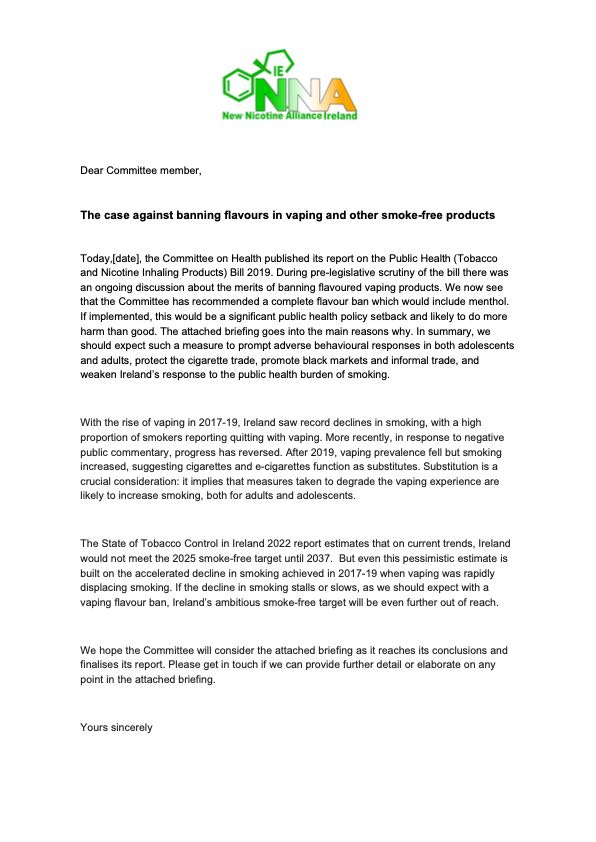The experts say the proposal, announced as part of the Health Committee’s new report, is likely to do more harm than good and would be a significant setback for the country’s public health policy.
Earlier this year, the State of Tobacco Control in Ireland 2022 report estimated that on current trends, Ireland will not meet its 2025 smoke-free target until 2037.
In a letter sent to the Department of Health and members of the Joint Committee on Health today, the signatories claim a vaping flavour ban would put Ireland’s ambitious smoke-free target even further out of reach.
This is because adult smokers who want to switch away from combustible cigarettes to vapes (e-cigarettes) overwhelmingly prefer flavoured products, and quit rates are higher among those using flavoured e-liquids.
The letter was signed by
- Frank Baeyens, PhD, Professor of Psychology, Faculty of Psychology and Educational Sciences, KU Leuven Belgium
- Clive D. Bates, MA, MSc, Director, Counterfactual Consulting, Former Director with Action on Smoking and Health, London, United Kingdom
- Carmen Escrig, PhD, Genetics and Cell Biology Autonomous University of Madrid Spain
- Karl Fagerström, PhD, Professor Emeritus Fagerström Consulting Stockholm, Sweden (inventor of the Fagerström test for cigarettes dependence, which is used by the Health Service Executive smoking cessation services)
- Konstantinos Farsalinos, MD, MPH, Researcher, University of Patras, Greece University of West Attica, Greece
- Thomas Gleeson, Trustee, New Nicotine Alliance Ireland Kilkenny, Ireland
- Jacques Le Houezec, PhD, Scientist, Smoking Cessation Specialist Trainer, Rennes, France
- Karl E Lund, PhD, Senior Researcher, Norwegian Institute of Public Health Oslo, Norway
- Dr John Madden, FRCGP, MICGP, Trustee, New Nicotine Alliance Ireland Donegal, Ireland

New Nicotine Alliance Ireland (NNA Ireland) says that if a flavour ban were to be introduced, it is likely many adults would face increased risks by relapsing to smoking, not switching in the first place, or by using unregulated or DIY vaping products.
According to Public Health England, now called the UK Health Security Agency, vaping is 95% less harmful than smoking and the rise of vaping in Ireland between 2017-19 coincided with record declines in smoking.
NNA Ireland adds: “More recently, though, progress has reversed, thanks to negative public commentary and the proliferation of misinformation about vaping. After 2019, the vaping prevalence fell but smoking increased, suggesting cigarettes and e-cigarettes function as substitutes, with people moving between the two products.
“This substitution effect suggests that measures taken to degrade the vaping experience are likely to increase smoking, both for adults and adolescents. A study of a ban on flavoured products in San Francisco showing a sharp rise in teen smoking compared to districts without a ban provides further evidence for this.”
References:
- New Nicotine Alliance Ireland - https://twitter.com/irelandnna
Dave Cross
Journalist at POTVDave is a freelance writer; with articles on music, motorbikes, football, pop-science, vaping and tobacco harm reduction in Sounds, Melody Maker, UBG, AWoL, Bike, When Saturday Comes, Vape News Magazine, and syndicated across the Johnston Press group. He was published in an anthology of “Greatest Football Writing”, but still believes this was a mistake. Dave contributes sketches to comedy shows and used to co-host a radio sketch show. He’s worked with numerous start-ups to develop content for their websites.
Join the discussion
Harm Reduction For The Rich
The United Kingdom risks becoming a harm reduction country only for the wealthy, according to Michael Landl of the World Vapers’ Alliance
CAPHRA Highlights Tobacco Control Flaws
The Coalition of Asia Pacific Tobacco Harm Reduction Advocates highlights the flaws in tobacco control which has led to the rise of black market in Australia
A Missed Opportunity at COP10
The Smoke Free Sweden movement says that COP10 was a missed opportunity to save millions of lives
COP10: Promote Tobacco Harm Reduction
Experts with Smoke Free Sweden are emphasising the urgent need for a Tobacco Harm Reduction approach at COP10






-listing400.jpg)




